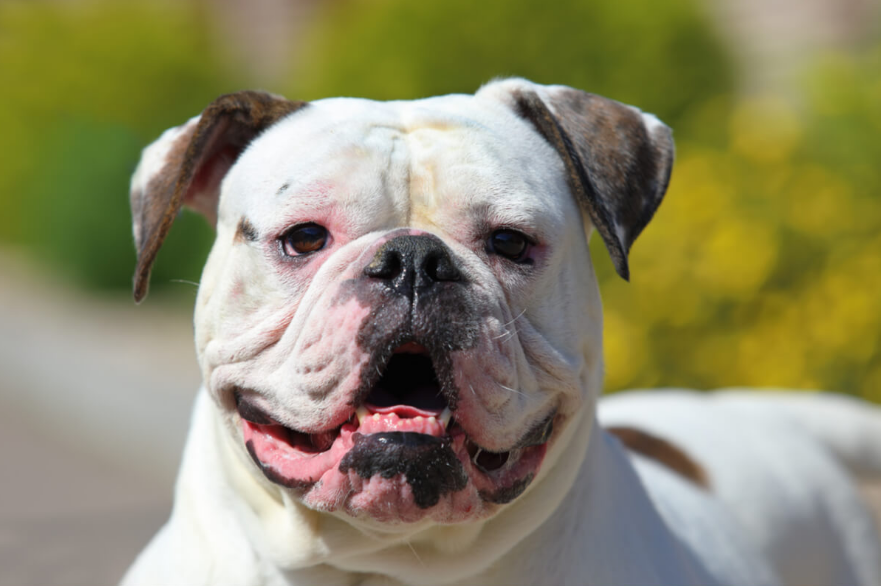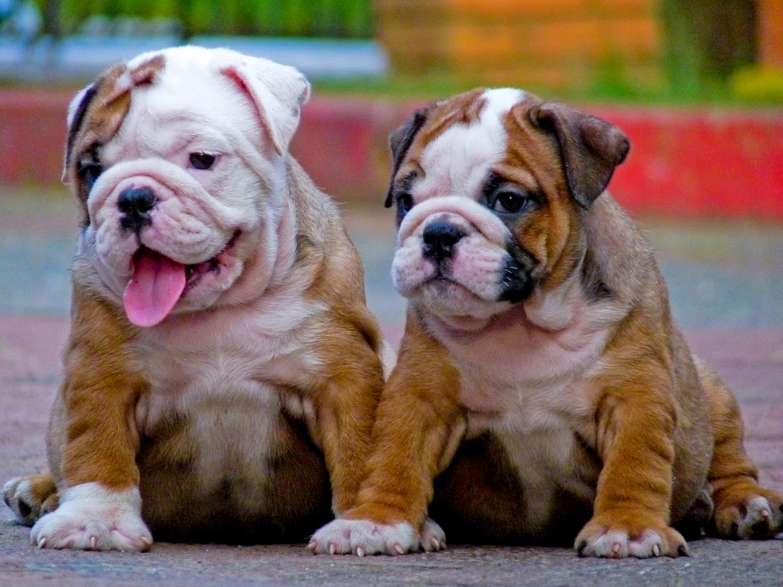Bulldog
“Bulldog” typically refers to the medium-sized breed of dog recognized for its muscular build with loose skin, distinct nose with a pushed-in look and distinctive wrinkled face. Bulldogs are renowned for their affectionate and docile behavior, making them appropriate as pet dogs for the family. There are many bulldog breeds, such as those named English Bulldog, French Bulldog as well as the American Bulldog, each with distinct characteristic.
- English Bulldog: The breed is recognized by its loose, saggy and sagging skin with a distinctive nose that is pushed-in, and a muscular body. They are renowned for their gentle and calm nature.
- French Bulldog: smaller in size than those of English Bulldog, with large “bat ears” and a small, muscular body. French Bulldogs are famous for their affectionate and loving behavior.
- American Bulldog: More agile and athletic over The English Bulldog, with a robust and muscular physique. They are frequently used for working dogs, or as guards.
Bulldogs sport a distinctive look and are renowned because of their attractive personalities. It’s important to keep in mind that because of their distinctive physical characteristics, they could require special attention, especially during hot weather, since they are susceptible to overheating. Regular check-ups with the vet, good diet, and attention to the specific needs of bulldogs are vital to assure the health of bulldogs.
Bulldog Health and Grooming
Health Care:
Regular Veterinary Check-ups:
- Bulldogs could have particular health concerns, such as skin infections or respiratory issues. Regular check-ups with a veterinarian are vital to deal with any health issues promptly.
Weight Management:
- Bulldogs are susceptible to obesity that can worsen existing health issues. Check their diets, deliver balanced nutrition, and exercise regularly to keep an appropriate weight.
Respiratory Care:
- Because of the brachycephalic (short-nosed) design Bulldogs are susceptible to respiratory problems. Avoid intense exercises in hot weather. Also, impart an air-conditioned, cool surroundings.
Skin and Wrinkle Care:
- Bulldogs have wrinkled, loose skin that requires frequent cleaning to avoid irritation and infections. Cleanse and dry gently between wrinkles, paying particular attention to areas surrounding the face.
Eye Care:
- Bulldogs can be susceptible to eye problems. Cleanse their eyes and look for signs of discharge, redness or irritation. Make sure to trim regularly any facial hair that may cause irritation to their eyes.

Grooming:
Bathing:
- Bulldogs shouldn’t require frequent baths because excessive bathing can remove their skin of natural oils. Make sure to bathe them when needed typically every 4-6 weeks using gentle dog shampoo.
Brushing:
- Regular brushing can benefit remove hairs that are loose and also prevents matting. Use a soft brush, or grooming tool to ensure their coat is in good shape. Be aware of areas that have wrinkles, like in the neck area.
Ear Cleaning:
- Bulldogs are susceptible to Ear infections. Make sure to clean their ears frequently and look for any signs of swelling, redness or a foul smell. Make use of a vet-approved ear cleansing solution, and be careful not to insert any objects in the canal of their ear.
Nail Trimming:
- Maintain their nails at an appropriate length. If you’re not confident doing it yourself, consult your doctor or well-qualified groomer to benefit you.
Dental Care:
- Dental hygiene is essential for Bulldogs. Cleanse their teeth often, give dental chews, and think about dental exams to avoid dental issues.
Bulldog Care and Feeding
Feeding:
High-Quality Dog Food:
- Select a premium, high-quality dog food that is suited to the nutritional requirements of Bulldogs. Find a formula that is specifically made for medium-sized breeds that take attention to their particular health issues.
Feeding Schedule:
- Bulldogs have a steady eating schedule. Adult Bulldogs usually eat daily, but puppies might require frequent meals. Talk to your vet for guidance regarding the size of portions and frequency of feeding.
Monitor Weight:
- Bulldogs are at risk of overweight, which may exacerbate health problems. Be aware of their body weight, and modify their consumption accordingly. Sweets should be consumed in moderation.
Hydration:
- Be sure that your Bulldog is able to drink fresh, clean water every day. A healthy diet is vital to overall well-being.
Exercise:
Moderate Exercise:
- Bulldogs aren’t high-energy breeds However, they do require regular exercise in order to keep healthy weight and to improve overall health. A daily walk and playtime is typically enough.
Avoid Overexertion:
- Because of the brachycephalic (short-nosed) shape Bulldogs could suffer from breathing problems. Avoid intense exercises in hot weather and pay attention to any signs of fatigue, or breathing problems.

Grooming:
Regular Brushing:
- Clean your dog’s coat frequently to get rid of loose hair and to prevent matting. Use a soft brush, or grooming glove, paying particular special attention to wrinkled areas.
Wrinkle Care:
- Cleanse and dry the wrinkles on their faces frequently to avoid irritation and infections. Take care not to cause discomfort.
Ear Cleaning:
- Bulldogs are susceptible to the ear and cause. Keep their ears clean together an approved ear-cleaning solution. Check for any indications of infections.
Dental Care:
- Regularly brush your dog’s teeth to maintain a healthy dental hygiene. Give them chewing gum or a toy for them to benefit to keep your dog’s teeth in good shape.
Health Care:
Regular Vet Check-ups:
- Make sure you schedule regular vet visits to assess the health of your Bulldog’s entire body and address any issues promptly.
Watch for Health Issues:
- Be aware of health issues specific to breeds like respiratory conditions as well as joint problems and skin problems. Take action immediately if you notice any signs of discomfort or disease.
Special Considerations:
Temperature Sensitivity:
- They are prone to heat, particularly the heat. Make sure you favor a cool and ventilated space, and do not exercise them in the heat during the day.
Feeding Height:
- Bulldogs could get a boost from higher food bowls and water bowls in order to lessen the stress placed on their necks and back when they eat.
FAQs
1. What are the various types of Bulldogs?
- There are many kinds of Bulldogs that include Bulldogs of the English Bulldog, French Bulldog and American Bulldog. Each has distinct characteristic and characteristics.
2. Are Bulldogs the best pet for families?
- They are renowned for their gentle and friendly nature, which makes them excellent pets for the family. They tend to be attracted to children and be a good fit for indoor environments.
3. Do Bulldogs need enough exercise?
- Bulldogs aren’t very active dogs, however they need to be exercised regularly to keep their weight in check. Regular walks and playtime is typically sufficient, however, vigorous exercise in hot weather is best avoided because of their brachycephalic characteristics.
4. How can I take care of the wrinkles of a Bulldog?
- It is important to clean the wrinkles on your Bulldog frequently to avoid irritation and infections. Cleanse the wrinkles with a soft fabric or baby wipe to ensure the area stays dry.
5. What is the average lifespan of an Bulldog?
- The life span of Bulldogs is variable however, on average they can live between 8 and 12 years. If you take care of them properly, they will get the right nutrition as well as regular vet check-ups could lead to a longer and more healthy life span.
6. Do Bulldogs have a tendency to develop illnesses of the body?
- Yes, Bulldogs are vulnerable to certain ailments, such as respiratory issues due to their brachycephalic structures as well as skin infections due to wrinkles, joint disorders and. Regular veterinary visits and a focus on their particular requirements will benefit deal with these issues.
7. How often do I need to brush my Bulldog?
- Bulldogs must be groomed on a regular basis to ensure their coats and overall health. Make sure to brush their coats every week at a minimum Cleanse their wrinkles whenever necessary, and pay close particular attention to ear cleaning as well as nail trimming and dental hygiene.
8. Are Bulldogs well-behaved with other pets?
- Bulldogs are generally able to coexist with other pets. However, the socialization aspect is essential. The early exposure to other animals and positive interactions may benefit them adjust to living alongside other pets in the family.
9. Can Bulldogs endure hot temperatures?
- Bulldogs are prone to heat because of their small noses and their respiratory structures. It is essential to serve an air-conditioned and cool space, stay away from strenuous exercise during hot weather, and be aware of the signs of heat exhaustion.
10. What do I give my Bulldog?
- Bulldogs need to be fed premium appropriate, age-appropriate dog food. Discuss with your veterinarian to determine the appropriate portions and feeding times depending on your dog’s weight, age and activity level.

